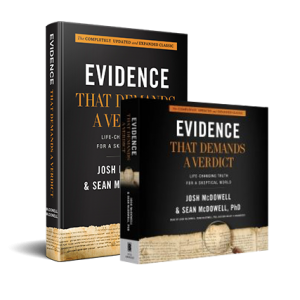
Bible scholars have a proven track record of resolving contradictions to harmonize the Bible.
In this blog post we explore the claim by skeptics that the Bible contradicts itself.
Are there differences among parts of the Bible? Yes. But are they contradictions? No. We assert this for two reasons: 1) The Bible is the inerrant Word of God, and 2) Alleged contradictions have been proven to not be contradictions as new, relevant discoveries come to light.
The Bible, as inspired by God and recorded by men, is a book of truth. Sometimes we just can’t see the truth because our view is too narrow. It’s like our looking at a scene through the viewfinder of our camera. We can only capture what is within the borders of the shot frame. Just because the camera doesn’t capture the rest of the scene, doesn’t mean it’s not there. Too, we must remember that each writer of Scripture brought his own personal/cultural perspective.
The Bible is composed of 66 smaller books written by a variety of authors, at different times, with different styles, and in different genres. The poetry of Psalms, for instance, should be read differently than the historical narrative of Joshua, the laws in Leviticus, individual Proverbs, or the Gospels. We recognize that God has chosen to reveal Himself through a rich diversity of genres. Each writer communicated what God led him to write, but did so in his own way. That’s not a surprise to God!
Yet one way that Satan leads people away from God is by championing the notion that the Bible can’t be trusted — and, thus, neither can God. This sounds logical, IF the first assumption is correct. But it’s not. Skeptics are free to make whatever claims they like, just as we are free to disregard them. Not because we’re sticking our heads in the sand, but because of God’s track record of being faithful.
Let’s define the term “contradiction,” and look at just five mistakes critics commonly make when they deem the Bible to contain contradictions.
Defining Contradictions
A contradiction occurs when two or more statements pull in opposite directions. For example, these two statements contradict each other: “The Bible contains contradictions” … “The Bible does not contain contradictions.” They are logically contradictory because one affirms and one denies. But both statements cannot be true.
When studying the Bible, a key question is not necessarily what it says, but what it means.
Some passages appear contradictory, but there are compelling, independent reasons to believe that when all the information is available, the Bible proves itself to be completely without error. Walter Kaiser, author of Hard Sayings of the Bible, in asking the question, “Why are there so many discrepancies and difficulties in the Bible?”, makes this reply:
“There are a great number of sources to which we can trace them: errors of copyists in the manuscripts that have been handed down to us; the practice of using multiple names for the same person or place; the practice of using different methods for calculating official years, lengths of regencies and events; the special scope and purpose of individual authors, which sometimes led them to arrange their material topically rather than chronologically; and differences in the position from which an event or object was described and employed by the various writers.”
All of these factors, and more, he concludes, have had a profound influence on the material. Of course, to those who participated in the events, those factors were less of a barrier than they are to us. Our distance from the time and culture amplifies our difficulty. But that’s true with any historical event. Consider the wealth of personal experience that will be lost to our country upon the deaths of the last of our World War II veterans and remaining Holocaust survivors.
Common Mistakes Critics Commit When Alleging Contradictions
In their book Big Book of Bible Difficulties, scholars Norman Geisler and Thomas Howe identify 17 prevalent mistakes Bible critics commit when alleging biblical contradictions. These apply to both the Old and New Testaments. We list just five of the mistakes below:
Presuming the Bible Guilty Until Proven Innocent
Many critics assume the Bible is wrong until something proves it right. But the Bible should be considered truth until proven that it’s not. This is not asking anything special for the Bible; it is the way we approach all human communication. If we, for example, assume road signs and traffic signals couldn’t be trusted, we’d likely lie in a traffic accident before we could prove they were telling the truth. Likewise, if we assume food labels are wrong until proven right, we would have to open every can and package before buying it to ensure it’s what we want to buy. The Bible should be presumed to be telling us what the authors said and heard.
Says Geisler: “The Bible cannot err, since it is God’s Word, and God cannot err. This does not mean there are no difficulties in the Bible. But the difficulties are not due to God’s perfect revelation, but to our imperfect understanding of it.”
Failing to Understand the Context of the Passage
Taking scripture out of context is perhaps the most common mistakes made by critics. One can prove anything from the Bible by taking a passage out of context. A perfect example: The Bible says “There is no God” (Psalm 14:1). But the full scripture is “The fool has said in his heart, ‘There is no God.'”
Assuming That Divergent Accounts Are False
Just because two or more accounts of the same event differ, it does not mean they are mutually exclusive. For example, Matthew 28:5 says that there was one angel at the tomb after the resurrection, whereas John tells us there were two (John 20:12). These are no contradictory reports. In fact, there is am infallible mathematical rule that easily explains this problem: whenever there are two, there is always one. Matthew did not say there was only one angel. One has to add the word “only” to Matthew’s account to make it contradict John’s.
Assuming That a Partial Report Is a False Report
Critics often jump to the conclusion that a partial report is false. But this is no so. If it were, most of what has ever been said would be false, since seldom does time or space permit an absolutely complete report. Occasionally the Bible expresses the same thing in different ways, or at least from different viewpoints, at different times. So inspiration does not exclude a diversity of expression. The four Gospels relate the same story in different ways to different groups of people, and sometimes even quote the same saying with different words.
Forgetting That Later Revelation Supersedes Previous Revelation
Sometimes critics of Scripture forget the principle of progressive revelation. God does not reveal everything at once, nor does He always lay down the same conditions for every period of time. Therefore, some of His later revelations will supersede His former statements. Bible critics sometimes confuse a change of revelation with a mistake. But the mistake is on the part of the critic. For example, when God created the human race, He commanded that they eat only fruits and vegetables (Genesis 1:29). But later, in Genesis 9:3 He commands that they also eat meat. This is a progressive revelation, not a contradiction.
Reading the Bible is Key
Human knowledge is limited and history is messy, so we should expect to face puzzling issues in the Bible, since we don’t have God’s all-knowing gaze. There is good reason to believe the Bible is true, and so we give it every benefit of the doubt.
Some critics, however, refuse to believe that God is good and trustworthy, typically for personal reasons. Some are mad at God. Others claim they adhere to strict logic. Others believe science to be the only trustworthy source of information. Others believe the Bible to be detrimental to society, saying its “harmful teachings has had a disastrous effect on society.”
We’ll agree that humans, throughout history, have had a tendency to cherry pick from the Bible to champion or defend their actions. But we can’t agree that God’s Word is full of “harmful teachings.” Anyone who has read the teachings of Christ would have to admit that Christ calls us to sacrificial love.
It is sad that many Christians don’t know what the Bible says. Because they’re not taking the time to read it. In one 2013 poll, 57 percent of the U.S. Christians canvassed admitted they opened their Bibles maybe four times a year. Only one in five read the Bible on any regular basis.
How can the Body of Christ expect to have any influence, if Christians aren’t getting serious about knowing what their Lord says?
It’s fine for critics to have their viewpoint, but it’s not fine for Christians to naively assume their anti-God views are correct. As critics themselves prove, it’s quite easy to twist Scripture to fit a particular view. Case in point: a friend recently shared that he abandoned his Catholic faith — after reading The DaVinci Code — which he took as truth and fact. The book showed him, he said, that the Bible contradicts itself too much for Him to believe in God anymore.
The tragedy here: the novel is pure fiction.
Though critics commonly assert that the Bible contains authentic contradictions, many Bible scholars have provided plausible harmonizations over the centuries.
Alleged contradictions often arise from mistakes in interpretation, ignoring genre or literary devices, or other faulty assumptions. But given the track record of Bible scholars in resolving alleged contradictions, we can have confidence that if all the facts were known, all contradictions would disappear.

This blog post highlights Josh and Sean McDowell’s recently revised apologetics classic, Evidence That Demands a Verdict. We are certain this fully updated and expanded resource will be an effective evangelism tool for you, and strengthen your faith by answering the toughest questions tossed to you by skeptics. Know what you know, because it’s true. But share this truth with LOVE!
If you’d like to start from the first blog post in this series, click here: Apologetics: Apologizing for Believing in God?.



